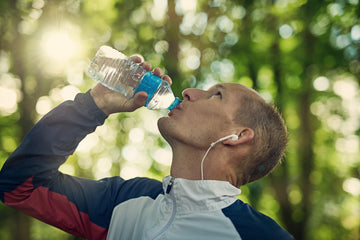When we talk about hydration and electrolytes, many immediately think of sodium, potassium or magnesium. But an often overlooked but crucial mineral is chloride . In combination with other electrolytes, chloride plays a key role in regulating water levels and maintaining acid-base balance in the body. Especially for athletes who train intensively and sweat a lot, chloride is essential to maintain performance and ensure optimal hydration. In this article, you will learn why chloride is so important, how it affects hydration and how you can specifically integrate it into your training routine.
What is chloride?
Chloride is an essential electrolyte found in the body's fluids, especially blood. It plays a central role in maintaining osmotic pressure and ensuring that water and electrolytes are properly distributed in cells and tissues. Chloride is also part of the acid-base balance and supports the function of nerves and muscles. The supply of chloride is particularly crucial during strenuous activities, during which a lot of fluid and electrolytes are lost.
How is chloride different from other electrolytes?
While sodium and potassium play an important role in muscle contraction, chloride is primarily responsible for regulating fluid balance. It acts as an antagonist with sodium and potassium to maintain a balance between electrolytes. Adequate chloride levels ensure that cells remain properly hydrated and the body functions optimally.
Why is chloride so important for athletes?
maintaining fluid balance
During intense exercise, athletes sweat a lot, and important electrolytes such as sodium, potassium and chloride are lost with the sweat. Chloride helps maintain the balance of these electrolytes and regulates fluid distribution in the body. Without enough chloride, the body cannot retain water effectively, which can lead to dehydration and a decline in athletic performance.
support of muscle and nerve function
For athletes, muscle and nerve function is of paramount importance. Chloride contributes to the electrical conduction of nerves, which is necessary to trigger muscle contractions. Without sufficient amounts of chloride, muscle cramps and poorer responsiveness can occur, which directly affects athletic performance.
regulation of the acid-base balance
A balanced acid-base balance is particularly important to protect the muscles during intense exercise. Chloride acts as a buffer and helps to regulate the pH value of the blood. If the pH value in the body fluctuates too much, this can lead to muscle tension and faster fatigue.
How does the body lose chloride during exercise?
When you sweat, you lose not only water but also electrolytes, including chloride. High-intensity exercise like running, cycling or CrossFit can cause you to lose up to 2 liters of fluid per hour - and with that fluid, about 3 to 5 grams of sodium chloride (salt). A lack of chloride can lower blood pressure and reduce blood volume, which in turn impairs physical performance.
The Role of Chloride in Hydration
Proper hydration isn't just about drinking water. Without adequate electrolytes like chloride, water can't be stored efficiently in cells, and you may still feel dehydrated despite adequate fluid intake. Chloride helps retain water in the body and maintain blood circulation. It also helps the body respond better to temperature changes, which is especially important when training in hot weather or intense competitions.
Chloride-rich foods and drinks for athletes
It is crucial to replenish chloride levels after strenuous activity. Here are some of the best chloride sources for athletes:
table salt (sodium chloride)
Table salt is one of the easiest and most common sources of chloride. If you sweat a lot, it may be helpful to lightly salt your meals to compensate for electrolyte loss.
vegetable juices
Vegetable juices such as tomato juice or carrot juice naturally contain chloride and at the same time provide a variety of other important nutrients.
Salty soups
Salty broths and soups are ideal for restoring electrolyte balance after a long workout. In addition to chloride, they often also contain potassium and sodium, which together ensure optimal hydration.
sports drinks
Many sports drinks already contain chloride and other electrolytes such as sodium and potassium. Make sure to choose products that are specifically designed to replenish electrolytes after exercise.
When and how should you take chloride?
The best time to replenish chloride and other electrolytes is immediately after exercise, when you have sweated heavily. Drink a sports drink or consume chloride-rich foods to quickly restore your body's fluid and electrolyte balance. It can also be useful to drink an electrolyte-containing drink during exercise, especially during long endurance sessions, to prevent deficiencies.
Hydration strategy for athletes:
Before training : Make sure you are well hydrated and optimize your chloride levels beforehand. Salty snacks or a light broth before training can help.
During exercise : During intense workouts lasting longer than an hour, you should take chloride-containing drinks or electrolyte supplements to compensate for the loss.
After training : Replenish your chloride and electrolyte stores with a combination of salty foods, sports drinks or soups.
Conclusion: Chloride – the underestimated electrolyte for athletes
Chloride may get less attention than sodium or potassium, but it is just as crucial to hydration and performance in athletes. Without enough chloride, athletes can fatigue more quickly, lose performance, and increase the risk of dehydration. By incorporating chloride-rich foods and drinks into your diet, you will not only ensure optimal hydration, but also faster recovery and improved athletic performance.
Next step: Consciously integrate chloride into your diet and make sure you always have a balanced electrolyte intake during intensive training sessions – for maximum performance and healthy regeneration!





